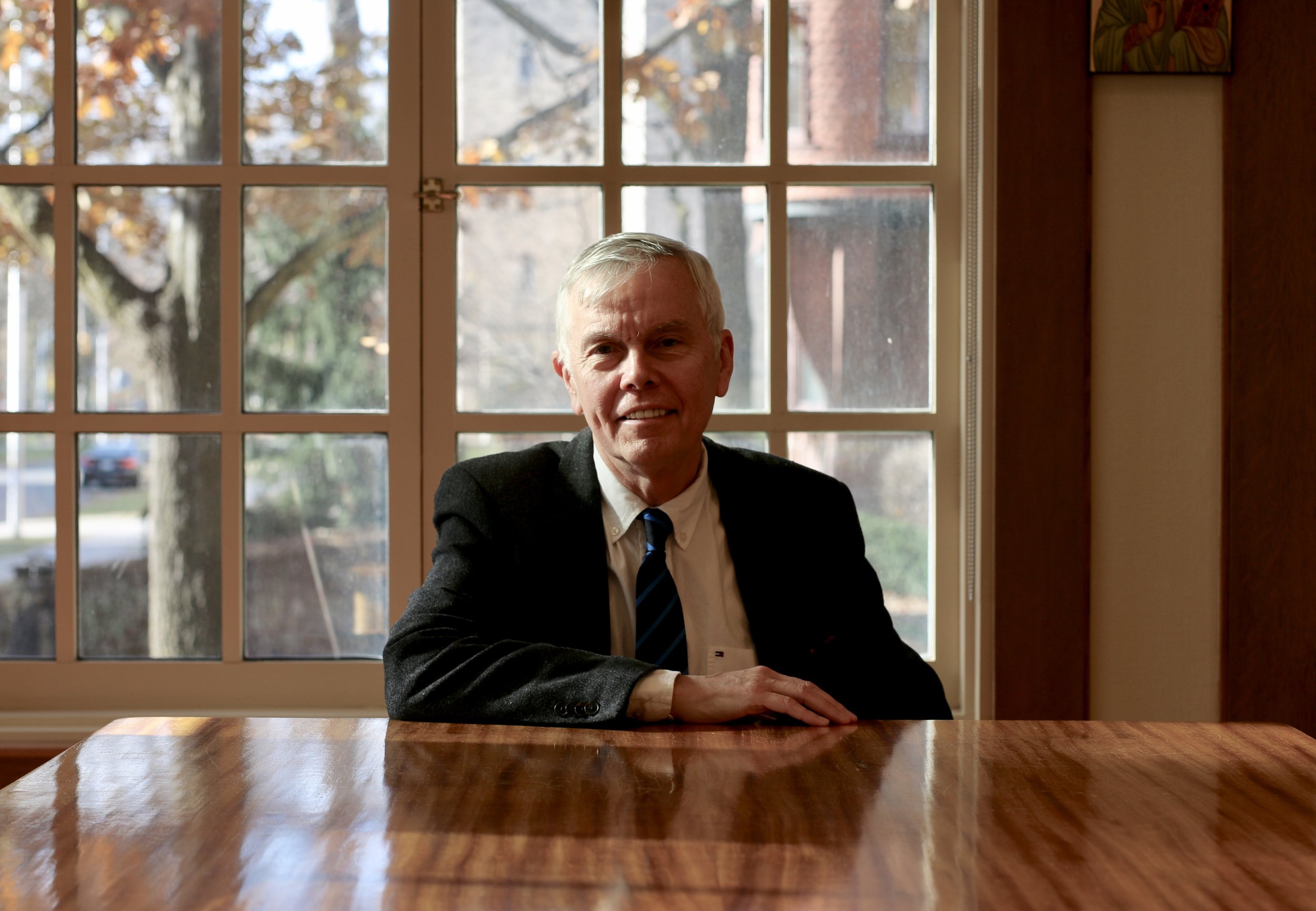President David Mulroney’s USMC
Josh Scott EDITOR-IN-CHIEF
Photo: David Mulroney (Layla Pereira-DaSilva / THE MIKE).
November 27, I spoke with University of St. Michael’s College (USMC) President and Vice- Chancellor David Mulroney in his office in Founders House. Our conversation touched on the past, the present, and the future of St. Mike’s. It gave Mulroney the chance to present his version of USMC and how he views his term, and gave me the opportunity to ask him some of the more pressing questions on the minds of USMC students today. The occasion marked the first time someone from The Mike had sat down with him in over two years. Given all that’s occurred in the interim, we had a lot to talk about.
Mulroney, a USMC graduate himself, was initially invited back to St. Mike’s while he was working at the Munk School of Global Affairs after over 30 years spent in Canada’s Public Service, many as a career Foreign Service Officer. “I was asked to come, I think, in part because there was a sense that St. Mike’s needed a change and that it needed to address some issues — and that it would be a special assignment,” Mulroney told me. In light of this, he thought, “[my return] should have a limited term, and so, we agreed on three years,” beginning July 1, 2015.
Past, Present, and Future
“I’ve tried to, in each of those years, take a different focus and theme,” said Mulroney. His first year focused on “putting a new system of financial administration in place.” His second year focused “on undergraduate student life,” and saw the introduction of Randy Boyagoda as USMC Principal and Vice-President, the launch of the Gilson Seminar, the hiring of new teachers, and the welcoming of the Sheptytksy Institute of Eastern Christian Studies to St. Mike’s’ downtown campus.
This year, Mulroney’s been “focused on consolidating those things — those gains — and also doing some work to reimagine [USMC’s] relationship with the Pontifical Institute of Mediaeval Studies (PIMS) and really encouraging both sides, St. Mike’s and PIMS, to be more ambitious when it comes to academic collaboration, as well as to think a little bit about the future of [USMC’s] Faculty of Theology.”
“What I’m proudest of is that I had a game plan and I’ve followed it,” said Mulroney. “One is to look at the financial and business administration of [St. Mike’s]. Two is to look at undergraduate student life, and three is to look at things like graduate and postgraduate life. And I think I will have addressed all of those things. I think I will have helped to put [St. Mike’s] in a place where an accomplished successor can come in and serve with distinction for some time to come.”
I also took the opportunity to ask Mulroney if there’s anything he thinks he might have done differently if he had the chance. “Anyone who says that he or she anticipated every single thing or knew everything about the university would be stretching the truth,” he replied. “I think I’ve learned a lot. I’ve probably made my share of mistakes, but I approached [the job] with the best will and the best intentions that I could bring to it, so I have no regrets. It’s been a challenging process, but it’s been one that I’ve taken deep satisfaction from.”

The Open Letter
I asked Mulroney about the open letter penned by USMC faculty and staff over the summer that accused Mulroney, in response to comments he had made at a June 19 conference to Catholic communicators from around the world, of doing a disservice to USMC students, dishonouring USMC’s legacy, and shaking their confidence in him as President.
“What bothered me about the letter and the reaction since then is the mischaracterisation that I denigrated all students, and I never did that,” said Mulroney. “Anyone who looked at the record and things that I’ve written and said on this topic will be clear and they should have been clear, frankly, that I’ve always said that there was a fault, and that if there was blame to go around, the blame is on [USMC] for failing to engage students.”
“I also heard from an awful lot of students who said things like, ‘I didn’t know where my money was going, and I’m glad that we’re making sure that it goes to things that can benefit me and other students like me.’ I’ve heard from people who said, ‘I was active in student government in my high school, so I tried to run for student government at St. Mike’s, and I didn’t really feel welcome or I didn’t get on with the particular agenda that was there and I’m glad that’s been changed.’ So, by and large, while some people haven’t liked what happened, a lot of people have, and I think it was the right thing to do. Was it an easy thing to do? No, but it was the right thing to do, and I think this will show as we go forward with the new SMCSU administration.”
The SMCSU Financial Audit
In March 2016, USMC publicly released only the Executive Summary of the St. Michael’s College Student Union (SMCSU) Financial Audit, which outlined gross financial mismanagement on the part of SMCSU dating back across the previous decade. The summary alluded to kickbacks, falsified invoices, and unidentified expenditures, among other things, across the past six years. I asked Mulroney why USMC chose not to release the full results of the SMCSU financial audit.
He replied that the decision was in order to “protect the privacy of individuals who came up [in the audit]. In releasing the Executive Summary, I’m more than confident that we released everything that was necessary… We all felt that this told the story of what had happened.” He also told me that this course of action was also at the advice of the accountants who led on the audit and the lawyers they consulted.
“I sat down and I talked to just about everybody whose name did come up,” he said. “We talked about what had happened, and I explained what we were going to do and what we weren’t going to do. In cases where I felt that people had possibly taken money that didn’t belong to them I asked that it be returned. A significant amount of money was returned. Not everybody agreed to do that. In some cases, we asked that people undertake voluntary activities in the community and at least some of the people named did… In part, to try to make up for some of the mistakes they had made.”
I also asked whether this was the extent to which the officials who were found responsible were held accountable. “Yes,” he said, “in part, because most of them had left the campus by this point. In some cases, we also asked that, where people just simply refused to consider doing any kind of community service, we did ask them voluntarily not to be part of our community life for a number of years — to reflect on that, simply because we were in such profound disagreement about what it is to be part of the St. Mike’s community.”

The New SMCSU’s Autonomy
I also asked Mulroney to address widely held concerns that the new SMCSU will be much less autonomous than previous versions of SMCSU — concerns that this will, as a result, hamper its ability to serve the interests of all USMC students. In his response, he deflected them: “I wouldn’t be worried about SMCSU’s autonomy. I think the greater question is building up SMCSU’s capacity to do things like manage $140,000 of student money every year, and to manage the several million dollars that are in the fund for investing in student facilities. Those are the really serious questions. SMCSU will continue to be autonomous.”
When I asked Mulroney whether stipulations such as the one outlined in the new “Re-Imagining Student Government at St. Mike’s Report” that requires a USMC Administrative Advisor to co-sign on any expenses exceeding $500 might result in USMC having undue influence over what SMCSU seeks to fund, he replied that “that’s a natural consequence of what we’ve been through. For now,” he said, “I think that’s appropriate in terms of where we’ve been, and it’s really to safeguard funds that all of our students put in the pool for student activities.”
“SMCSU needs to operate at a really high level for the benefit of all its students,” Mulroney added. “And from what I saw in our conversations, I think [this year’s administration is] really eager to do that, and so, we said we would help them.”
When I asked Mulroney whether he thinks that an LGBTQ+ club like St. Mike’s United should receive funding from SMCSU, he replied, “That’s entirely up to SMCSU.” I also asked whether he thinks a pro-life club like the University of Toronto Students For Life should receive funding from SMCSU, and his answer was the same, though he did add that he is, himself, “really keenly interested in pro-life causes.” Whether in practice this will be SMCSU’s decision “entirely” remains to be seen, and will be something worth paying close attention to come January and the next steps of the USMC club recognition and funding process.
Mulroney isn’t concerned that only nine students applied for six SMCSU positions, leaving three currently unfilled. “We’re coming off of a tough year for SMCSU,” he said. “I am very confident that this will be a successful year for the current administration, and that that will in itself be a great advertisement for participation in student government, and I say that as a guy who comes from government.”
Regarding SMCSU’s relationship with USMC going forward, he said, “We want to grant SMCSU the maximum degree of autonomy possible, but we also ask them to respect who and what [USMC is] as a Catholic institution.”
USMC has also been working to build up SMCSU’s “capacity,” in terms of “training, systems, getting away from cash management, and getting away from a situation where there would be sort of an empty safe with cash from club nights in it, cash that wasn’t counted from many weeks,” said Mulroney. “Building a system where people are aware of what their tasks are.”
“This is the one thing that I do bring to this place from my past: I come from government and one of the things I’m proudest of as a Canadian public servant is that there is a real passion in the Public Service of Canada for transparency, probity (meaning the careful and thoughtful management and stewardship of funds), and value for money. Student government should be something that you leave and serves as a springboard to maybe being in government in some other capacity — I really believe that. But the prerequisite is that sense of stewardship, and the notion that not one penny that crosses the desk belongs to you, that you’re not entitled to any special perks, that you should be grateful for the opportunity to serve. I am very confident that our current SMCSU administration radiates that.”
“Any organization that faced the problems that we faced would take a hard look at what happened and ask what went wrong and how do we make sure that never happens again? That’s really what this is all about. How do we ensure that we’ve got the best student government at St. Mike’s? I think we’re on track to do that. But it’s going to take some work.”
Being a Catholic University Federated Within a Secular Institution
According to Mulroney, “It’s a great challenge and it’s a great opportunity.” He views St. Mike’s as offering “an intellectual tradition, the Catholic intellectual tradition, that is valid and reflects the wisdom and experience of the Church — which created the modern university — and also, an approach to knowing that says that the world is basically intelligible: that it’s beautiful and that it’s full of meaning. The intellectual traditional springs from that orientation and also a willingness to accept the possibility of the transcendent. This is something that we offer uniquely on the University of Toronto campus and it’s a wonderful plus.”
“We welcome everybody. Everybody is free to be part of this community. But at our heart, we have certain values, and I call them gospel values, that distinguish us, and they include the fact that we care for one another and that the university cares for its students. That’s why I was so concerned about some of the problems at the very heart and core of SMCSU, not of all students, but of what it represented — a failure on our part to really care for students as we should.”
USMC: An “Intentional Community”?
According to Mulroney, USMC is an “intentional community.” By this, he means that “we’re here for a reason and we live as a community for a reason. Our intention is, I think, focused on those gospel values: that we care for one another, that we think that our lives have meaning, that we think that the role of the Catholic University is to have sort of an extended conversation with its students about what constitutes being a human being fully alive, what constitutes a good life.”
“It’s not a lecture,” Mulroney clarifies. “It’s not a discussion where we insist on people having the same answer. It’s certainly not a discussion where you can’t push back and argue in return.” He also acknowledges that being such a place is more difficult today than it was when he was an undergraduate student in the 1970s. However, he views these changing circumstances as making St. Mike’s as an institution “all the more valuable,” and as something Catholics and non-Catholics alike find attractive in a community and place of study.

The Brennan Hall Renovations
I asked Mulroney how exactly USMC plans to accommodate USMC students during the Brennan Hall renovations — which are occurring in part in order to move USMC’s Registrar’s Office out of Alumni Hall and into a more student-friendly location. The bulk of the renovations are projected to begin in spring 2018. He told me that this is something USMC is still working out in its consultations with students, and that this will be a particular focus for USMC’s Bursar, Effie Slapnicar.
“There will be some requirement for what we would call ‘swing space,’ where we move out of one place and into another,” he said. “We’ll try to make that as painless and swift as possible. While it is an inconvenience in some senses, it’s to get to a much better place than we’re at right now.” He also highlighted that USMC is “getting some good influence as [they] work on this,” referring to the fact that USMC has visited Ryerson’s new, award-winning Student Learning Centre.
The Student Society Leadership Policy
I also asked Mulroney to clarify what the following sentence in USMC’s new Student Society Leadership Policy means to him: “Leaders [of student societies] accept their ethical obligation to act in accordance to USMC’s mission as a Catholic University that is dedicated to the academic and spiritual life of its students.” He had the following to say:
“It means that they accept the ethical responsibility to be part of that process, to care enough for students, to care for their well-being, that you want to make sure that their physical safety is paramount, but also that they are treated with respect and that the resources that they contribute to this university are managed respectfully.”
“It’s also asking them, frankly, not necessarily to agree with but to respect the fact that we are a Catholic institution and that our name is on a lot of the activities that they engage in, in that we ask them to reflect on that before they engage in things that may bring them or us into disrepute,” he added. Of course, how this might apply in practice remains unclear.
The Mike and the Role of Student Newspapers
“I think that if I look back at what happened in the past… there is a job for The Mike to report on student life itself and sometimes to report critically, and I think that may have been a missed opportunity in the past at the level of The Mike or The Varsity, where maybe there were some questions, some tough questions, that needed to be asked.”
“You need autonomy from us — from me and the [USMC] administration — but you also need autonomy from SMCSU and from government to be able to serve students as they should be served. And the healthy Mike that’s asking those tough questions is probably the single most important guarantor of USMC student interests, in ensuring that student money is being spent correctly, that I can think of, so I encourage you and I think that you’re off to a good start.”

Life After USMC
“That’s a good question,” said Mulroney, with a smile. “I’m currently on the board of the three Catholic hospitals in Toronto that have amalgamated, and that takes a lot of my time now and I can see it taking more of my time. I also want to turn to something that I’ve left off, and that is the daily study of Chinese characters in Chinese language. So I’ll come back to that.” He also added that he wants to become more active in his parish. Mulroney’s term as USMC President completes in June 2018, and the search for his successor is already well underway.




